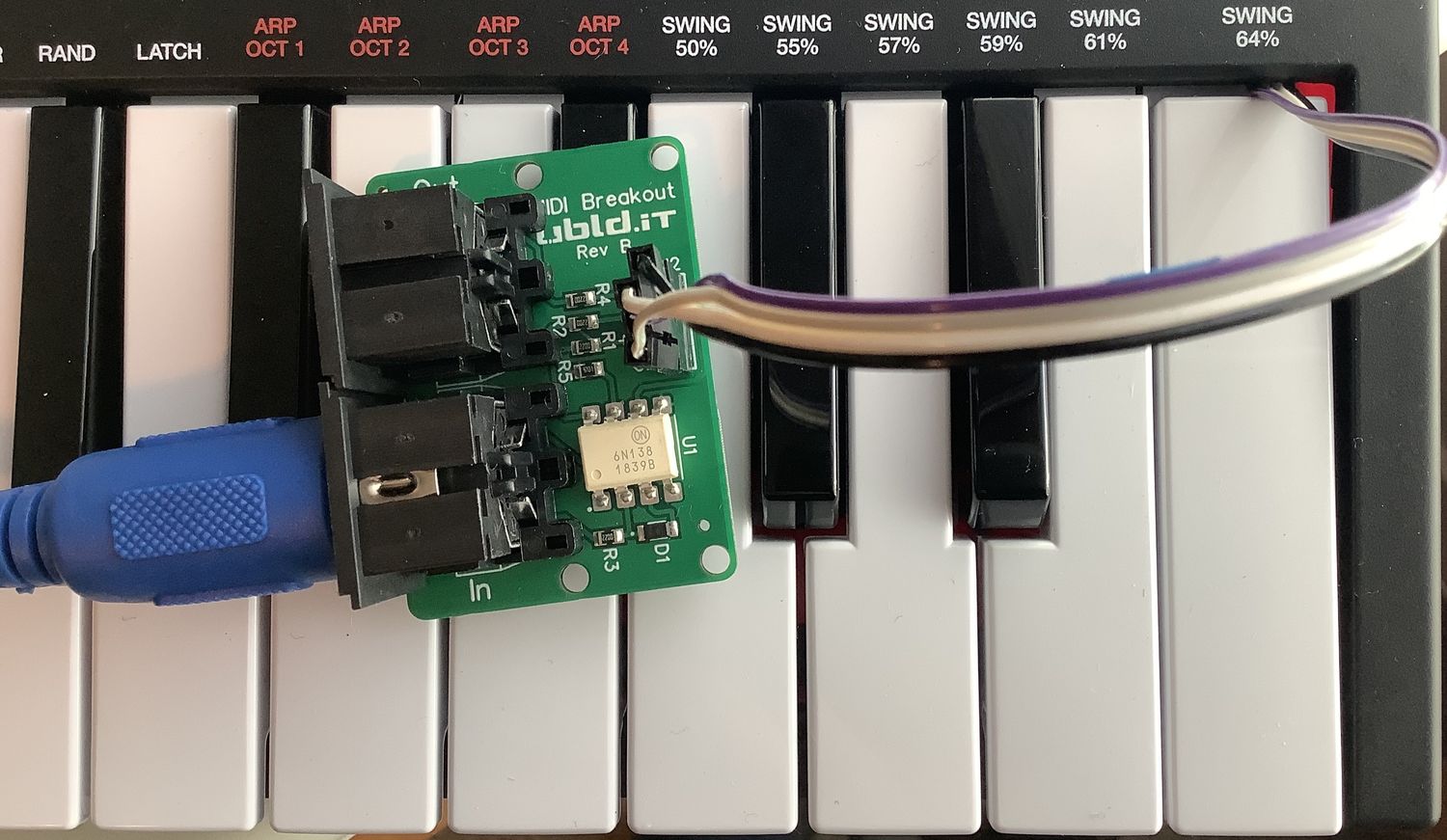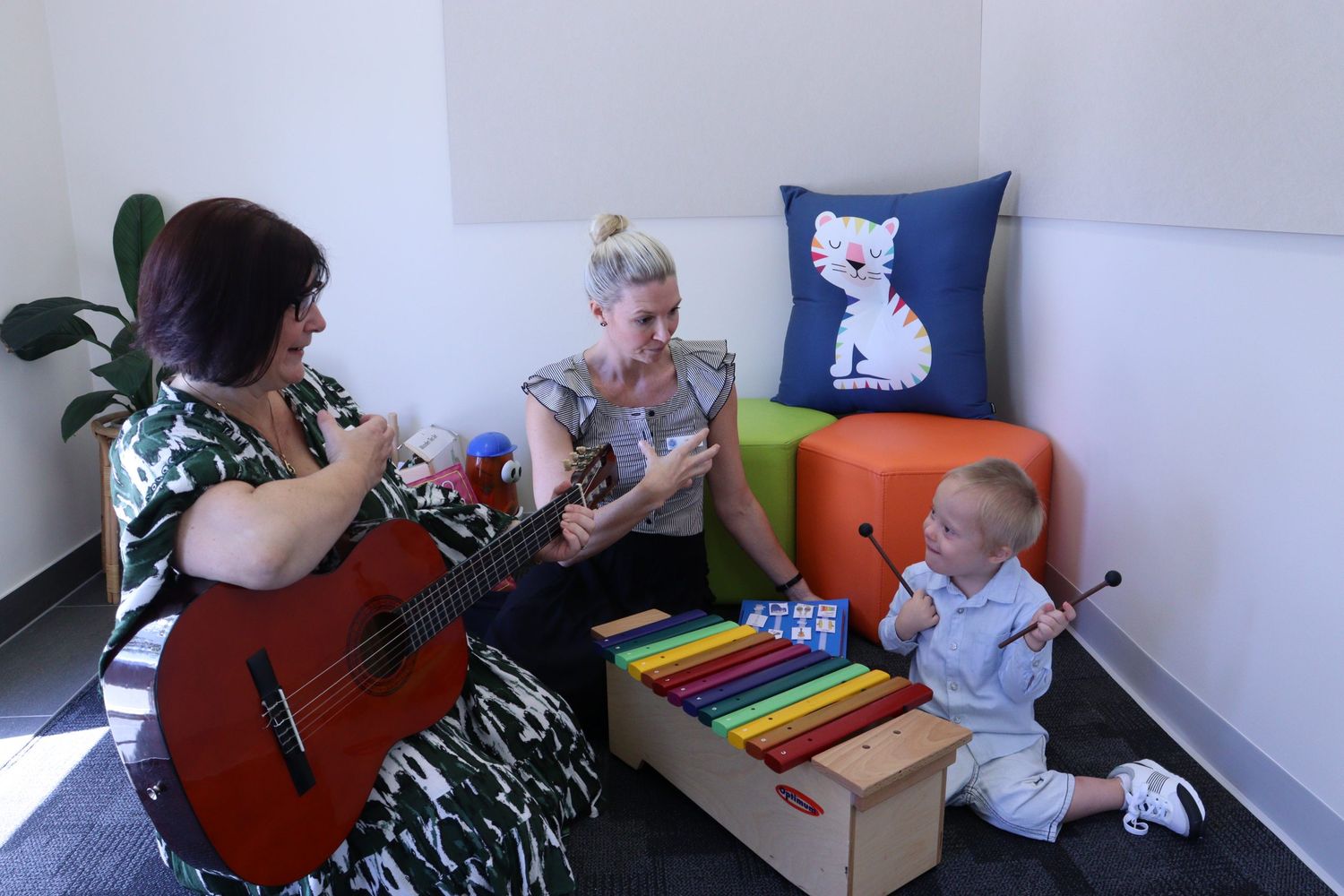Home>Events & Info>Music Therapy>What Is The Success Rate Of Music Therapy


Music Therapy
What Is The Success Rate Of Music Therapy
Modified: February 2, 2024
Discover the success rate of music therapy and how it can positively impact your well-being. Explore the benefits and effectiveness of music therapy for various conditions
(Many of the links in this article redirect to a specific reviewed product. Your purchase of these products through affiliate links helps to generate commission for AudioLover.com, at no extra cost. Learn more)
Table of Contents
Introduction
Music has always had a powerful and transformative effect on the human mind and body. It has been used as a form of expression, communication, and emotional release throughout history. However, in recent years, music has also been recognized for its therapeutic benefits in a field known as music therapy.
Music therapy is a specialized discipline that utilizes the power of music to address physical, emotional, cognitive, and social needs. It is an evidence-based practice that is conducted by trained and certified music therapists who work with individuals of all ages and abilities.
In music therapy sessions, a variety of musical experiences and techniques are employed to achieve specific goals. These can include listening to music, singing, playing musical instruments, improvising, composing, and even dancing to music. Music therapists work closely with their clients to create personalized interventions that cater to their unique needs and preferences.
The use of music therapy has grown rapidly in recent years, as more research has demonstrated its efficacy in improving various aspects of health and well-being. It has been successfully applied in a wide range of settings including hospitals, mental health facilities, rehabilitation centers, schools, and nursing homes.
This article aims to explore the field of music therapy, examine how it works, discuss its effects on individuals, and delve into the success rate of this therapeutic modality. By understanding the effectiveness of music therapy, we can appreciate its value and potential in promoting healing and personal growth.
Definition of Music Therapy
Music therapy is the clinical and evidence-based use of music interventions to address individualized goals within a therapeutic relationship by a credentialed professional who has completed an approved music therapy program. In simpler terms, it is a form of therapy that utilizes music as a means of communication and expression to improve the well-being of individuals.
Music therapists are highly trained professionals who have completed a bachelor’s, master’s, or doctoral degree in music therapy. They possess a strong foundation in music theory, psychology, and therapeutic techniques. Music therapy sessions typically involve the active participation of the individual, guided by the therapist, in engaging in musical activities such as listening, singing, playing instruments, and creating music.
The goals of music therapy are individualized and tailored to each person’s specific needs and circumstances. They may include improving physical health, managing pain and stress, enhancing emotional well-being, promoting cognitive development and communication skills, fostering social interaction, and supporting spiritual or existential growth.
Music therapy can benefit individuals of all ages and abilities, from infants to older adults. It is used in various clinical and non-clinical settings, such as hospitals, schools, community centers, and private practices. It is important to note that music therapy is not the same as music as a recreational or leisure activity. While enjoyment and relaxation can be part of the therapy process, the primary focus is on using music as a therapeutic tool to achieve specific outcomes.
As an evidence-based practice, music therapy is supported by a growing body of research that demonstrates its effectiveness in addressing a wide range of physical, emotional, cognitive, and social issues. It is a complementary therapy that can be integrated with other forms of treatment or used as a standalone intervention, depending on the individual’s needs and treatment plan.
In summary, music therapy is a specialized form of therapy that harnesses the power of music to promote healing, personal growth, and well-being. It is a unique and dynamic therapeutic modality that allows individuals to engage in a creative and expressive process, facilitating communication, emotional release, and positive change.
How Does Music Therapy Work?
Music therapy works through the unique qualities of music to elicit emotional, physical, and cognitive responses in individuals. The use of music as a therapeutic tool allows for nonverbal and creative expression, which can be especially beneficial for those who struggle to communicate through traditional means.
Music therapists utilize various techniques and approaches to meet the specific needs of each individual. Here are some of the ways in which music therapy works:
- Emotional expression and regulation: Music has the ability to evoke and express emotions in a powerful way. Through engaging with music, individuals can release and process their emotions, leading to emotional regulation and well-being. Music therapists may encourage clients to choose or create music that reflects their feelings or use specific techniques to help them explore and express their emotions.
- Physical stimulation and relaxation: Music has a direct impact on the body, influencing heart rate, blood pressure, and breathing. Upbeat and rhythmical music can increase energy levels and activate movement, which is particularly beneficial in physical rehabilitation. On the other hand, slow and calming music can promote relaxation, reduce stress, and alleviate pain.
- Cognitive stimulation and enhancement: Music engages multiple areas of the brain, stimulating cognitive processes such as memory, attention, and problem-solving. Music therapy can be used to improve cognitive skills, enhance learning, and support individuals with neurodevelopmental disorders or cognitive impairments.
- Social interaction and communication: Music has the power to connect people and facilitate social interaction. Music therapy sessions often involve group activities, such as singing or playing instruments together, which promote social bonding and enhance communication skills. For individuals with communication difficulties, music can serve as a medium for expression and connection.
- Creating a therapeutic environment: The therapeutic relationship between the music therapist and the client is of utmost importance in music therapy. The therapist creates a safe and supportive environment that encourages exploration, self-expression, and growth. The use of live music and improvisation allows for spontaneous and personalized interventions tailored to the individual’s unique needs.
It is important to note that the specific techniques and approaches used in music therapy may vary depending on the individual’s goals, preferences, and clinical context. Music therapists undergo extensive training to develop their skills and knowledge in using music as a clinical tool, ensuring the safety, efficacy, and ethical practice of music therapy.
In summary, music therapy works through the power of music to elicit emotional, physical, and cognitive responses. It provides individuals with a unique means of expression, supports their overall well-being, and fosters communication and connection.
The Effects of Music Therapy
Music therapy has been shown to have a wide range of positive effects on individuals across various populations and settings. The unique qualities of music, combined with the therapeutic techniques employed by music therapists, contribute to these beneficial outcomes. Here are some of the effects of music therapy:
- Emotional well-being: Music has the power to evoke and express emotions, allowing individuals to release and process their feelings. Music therapy can help reduce anxiety, improve mood, alleviate depression, and provide a sense of comfort and emotional support. It offers a safe and non-judgmental space for individuals to explore and express their emotions.
- Pain management and relaxation: Listening to calming music or engaging in music-making activities can promote relaxation and reduce pain perception. Music therapy is especially effective in healthcare settings, such as hospitals and rehabilitation centers, as it provides a non-pharmacological approach to pain management.
- Physical rehabilitation and motor skills: Music therapy can support physical rehabilitation by incorporating rhythmic cues, movement exercises, and instrument playing. It helps improve motor skills, coordination, and balance in individuals with neurological conditions, stroke survivors, and those undergoing physical therapy.
- Cognitive function and memory: Engaging with music can stimulate cognitive processes, enhance memory, and improve attention and focus. Music therapy is particularly beneficial for individuals with cognitive impairments, Alzheimer’s disease, or traumatic brain injuries, as it can provide a structured and engaging framework for cognitive stimulation.
- Social interaction and communication: Music therapy promotes social interaction and communication skills through group activities, singing, and playing music together. It can improve social skills, foster a sense of belonging, and enhance communication in individuals with autism spectrum disorder, developmental disabilities, or social anxiety.
- Stress reduction and relaxation: Listening to calming music or engaging in music-making activities triggers the release of endorphins, reducing stress and promoting relaxation. Music therapy techniques, such as guided imagery and progressive muscle relaxation, support individuals in managing stress, anxiety, and sleep disorders.
- Enhanced self-expression and creativity: Music therapy provides individuals with a creative outlet for self-expression and exploration. It allows for nonverbal communication, encourages personal creativity, and supports individuals in finding their unique voice. This can be particularly valuable for individuals who struggle with traditional forms of communication.
It is important to note that the effects of music therapy may vary depending on the goals, preferences, and needs of each individual. The therapeutic relationship between the music therapist and the client plays a vital role in facilitating these positive outcomes. By harnessing the power of music, music therapy empowers individuals to improve their overall well-being and engage in a holistic therapeutic experience.
Success Rate of Music Therapy
The success rate of music therapy varies depending on several factors, including the individual’s specific needs and goals, the expertise and approach of the music therapist, and the consistency and duration of the therapy sessions. While it is difficult to provide a precise success rate, numerous studies and case reports have shown positive outcomes in various populations and settings.
One of the key strengths of music therapy is its ability to engage individuals in a creative and non-threatening manner, which can lead to increased participation and motivation. Research has indicated that music therapy can be effective in improving emotional well-being, reducing anxiety and depression, and enhancing quality of life for individuals with mental health conditions, such as depression, anxiety disorders, and post-traumatic stress disorder (PTSD).
In the field of physical rehabilitation, music therapy has demonstrated positive outcomes in improving motor skills, coordination, and balance for individuals with neurological conditions, stroke survivors, and patients undergoing physical therapy. It can also aid in pain management by providing distraction and promoting relaxation.
For individuals with developmental disabilities, autism spectrum disorder, and communication difficulties, music therapy has shown promising results in enhancing social interaction, communication skills, and self-expression. The structured and engaging nature of music therapy sessions creates opportunities for individuals to practice and develop social skills, improve speech and language abilities, and foster a sense of connection and belonging.
Music therapy has also been found to have a positive impact on cognitive function, memory, and attention. It can support cognitive rehabilitation for individuals with traumatic brain injuries, Alzheimer’s disease, and other cognitive impairments. The multisensory nature of music engages various areas of the brain, stimulating neural pathways and promoting cognitive growth.
While music therapy can be highly effective, it is important to note that individual responses to therapy may vary, and not all individuals may experience the same level of success. Factors such as the individual’s commitment to therapy, the presence of other co-occurring conditions, and the availability of a supportive environment can also influence the outcomes of music therapy.
To assess the success of music therapy, both qualitative and quantitative measures are utilized. These can include self-report measures, clinical observations, standardized assessments, and qualitative interviews. Tracking progress and evaluating the achievement of goals are essential components of music therapy to ensure the effectiveness of the treatment plan.
In summary, while it is challenging to provide an exact success rate, music therapy has shown positive outcomes in improving emotional well-being, physical rehabilitation, social interaction, cognitive function, and communication skills. The individualized and evidence-based nature of music therapy allows for tailored interventions that address the specific needs and goals of each individual, increasing the likelihood of success.
Factors Influencing the Success Rate
The success rate of music therapy can be influenced by various factors that impact the overall effectiveness and outcomes of the therapy. Understanding these factors can help individuals and therapists optimize the chances of achieving successful results. Here are some key factors that can influence the success rate of music therapy:
- Individualized approach: The success of music therapy depends on tailoring the approach to the specific needs, preferences, and goals of the individual. Every person is unique, and their therapy should be personalized to address their specific challenges and strengths.
- Therapist-client rapport: The therapeutic relationship between the music therapist and the client is crucial in establishing trust, creating a safe space, and maintaining open communication. A positive and strong rapport enhances the effectiveness of therapy and increases the likelihood of successful outcomes.
- Goal setting and treatment planning: Clearly defining goals and creating a comprehensive treatment plan is essential in guiding the therapy process. Setting realistic and measurable objectives helps track progress and allows for adjustments as needed.
- Consistency and duration of therapy: Regular and consistent attendance in music therapy sessions is vital for achieving successful outcomes. The duration of therapy can vary depending on the individual’s needs, but longer-term engagement often yields better results as it allows for greater exploration, growth, and integration of therapeutic experiences.
- Collaboration with other professionals: Music therapy can be integrated with other treatments or interventions, such as speech therapy, physical therapy, or counseling. Collaborating with other professionals can enhance the effectiveness of overall treatment and support the individual’s holistic well-being.
- Supportive environment: The support and encouragement from family, friends, and caregivers play a significant role in the success of music therapy. Creating a supportive environment that reinforces therapy goals and celebrates progress can contribute to positive outcomes.
- Individual motivation and engagement: The active participation and motivation of the individual in music therapy sessions greatly impact the success rate. Willingness to engage in therapeutic activities, practice skills between sessions, and explore personal expression contribute to positive outcomes.
- Continued practice and integration: Successfully transferring the skills and experiences gained in music therapy to everyday life is essential for long-term success. Regular practice and integration of therapeutic techniques and coping strategies in daily routines can help sustain the progress achieved during therapy.
It is important to recognize that the success rate of music therapy may vary from person to person, and individual responses to therapy can differ. Each person brings unique strengths and challenges to the therapeutic process, and the success of music therapy should be evaluated in relation to their specific goals and progress.
By considering these factors and working collaboratively with the music therapist, individuals can increase the likelihood of achieving successful outcomes in music therapy. The key is to create a supportive and personalized therapeutic journey that addresses the individual’s needs, fosters growth and empowerment, and enables them to reach their full potential.
Case Studies and Research Findings
Case studies and research findings provide valuable insights into the effectiveness of music therapy and its impact on individuals across various populations and settings. The following examples highlight some notable case studies and research findings that support the positive outcomes of music therapy:
- Children with Autism: A case study published in the Journal of Music Therapy reported significant improvements in social communication skills and reduced problem behaviors in children with autism who received music therapy. The use of music-based interventions, such as singing and instrument playing, helped promote social interaction, emotional expression, and imitation skills in these children.
- Stroke Rehabilitation: Research conducted at the Center for Biomedical Research in Music at Colorado State University demonstrated the benefits of using music therapy in stroke rehabilitation. The study found that music-based interventions, such as rhythmic auditory stimulation and therapeutic singing, improved gait speed, balance, and motor function in stroke survivors. Music therapy facilitated the relearning of movements and provided a motivating and engaging environment for rehabilitation.
- Psychiatric Disorders: Studies have shown positive outcomes of music therapy in individuals with psychiatric disorders, such as depression, anxiety, and schizophrenia. Research published in the Cochrane Database of Systematic Reviews concluded that music therapy can reduce symptoms of depression and anxiety, leading to improved overall well-being. Music-based interventions have also been found to enhance emotional expression, social connection, and coping skills in individuals with schizophrenia.
- Dementia Care: Numerous studies have highlighted the benefits of music therapy in dementia care. A study published in the Journal of Alzheimer’s Disease reported that music therapy interventions improved cognitive function, communication, and mood in individuals with dementia. The use of personalized music playlists and reminiscence-based approaches helped evoke memories, preserve personal identity, and enhance quality of life.
- Pain Management: Research has demonstrated the effectiveness of music therapy in reducing pain and alleviating discomfort in various populations. A study published in the Journal of Advanced Nursing found that music therapy interventions, such as listening to preferred music or engaging in active music-making, reduced pain intensity and distress in patients undergoing medical procedures. Music therapy provided a distraction, relaxation, and positive emotional support, leading to improved pain management outcomes.
These case studies and research findings contribute to the growing body of evidence supporting the effectiveness of music therapy in addressing a wide range of physical, emotional, cognitive, and social needs. More research is continually being conducted to explore the specific mechanisms and approaches of music therapy and its potential applications in various clinical and non-clinical settings.
It is important to note that individual responses to music therapy may vary, and the success of therapy is highly dependent on several factors, including the individual’s goals, preferences, and therapeutic relationship. However, these studies provide a glimpse into the potential of music therapy to promote healing, personal growth, and well-being in diverse populations.
Limitations and Challenges
While music therapy has shown promising results and benefits, there are some limitations and challenges that need to be considered. These include:
- Evidence and research gaps: While there is a growing body of research supporting the efficacy of music therapy, more high-quality studies are needed to further validate its effectiveness and provide evidence-based guidelines. Some areas of music therapy, such as specific populations or interventions, may have limited research available.
- Individual variability: Each individual responds differently to music therapy, and what may work for one person may not work for another. It is essential to tailor the therapy to the individual’s specific needs and goals, taking into account their preferences, cultural background, and unique circumstances.
- Limited access to qualified music therapists: Access to trained and certified music therapists can be limited in some regions or healthcare settings. This can hinder the widespread availability of music therapy and restrict its potential reach to those who may benefit from it.
- Cost and insurance coverage: Music therapy sessions may not always be covered by insurance or healthcare plans, making it an expensive therapy option for some individuals. The cost of music therapy services can vary depending on the location and the qualifications of the music therapist.
- Measuring progress and outcomes: Evaluating the effectiveness of music therapy can be challenging due to the subjective nature of the therapeutic process. Objective measures and standardized assessments are used, but tracking progress and determining success can still be complex in a field that prioritizes individualized goals and outcomes.
- Adapting to individual needs and preferences: Music therapy requires flexibility and adaptability to meet the diverse needs and preferences of individuals. This can present challenges in finding the right musical interventions, styles, or activities that resonate with each individual’s unique circumstances and therapeutic goals.
- Lack of integration and awareness: Despite the growing recognition of music therapy, there can still be barriers to its integration into mainstream healthcare settings. Awareness and understanding of music therapy among healthcare providers, administrators, and the general public need to be increased to promote its accessibility and integration.
Despite these limitations and challenges, music therapy continues to provide valuable support and therapeutic benefits to many individuals. Ongoing research, training programs, and advocacy efforts are crucial in overcoming these obstacles and expanding the availability and acceptance of music therapy as a valuable intervention in various healthcare and educational settings.
Conclusion
Music therapy is a powerful and effective therapeutic approach that utilizes music to address physical, emotional, cognitive, and social needs. It has been shown to have positive effects in diverse populations and settings, including children with autism, stroke survivors, individuals with psychiatric disorders, dementia patients, and those experiencing pain or emotional distress.
Through the unique qualities of music, music therapy provides a safe and supportive environment for individuals to express themselves, enhance their well-being, and achieve their therapeutic goals. The success rate of music therapy is influenced by factors such as individualized approaches, therapist-client rapport, goal setting, consistency, collaboration, and a supportive environment.
While limitations and challenges exist, including the need for further research, individual variability, limited access to qualified therapists, cost considerations, and measurement difficulties, music therapy continues to demonstrate its value and effectiveness as an evidence-based practice.
As awareness and acceptance of music therapy grow, it is essential to continue advocating for its integration into healthcare settings, promoting insurance coverage, and expanding the availability of trained music therapists. Ongoing research and evidence-based practice are critical in further strengthening the foundation of music therapy and uncovering its full potential in promoting healing, personal growth, and well-being.
In conclusion, music therapy harnesses the power of music to enhance the lives of individuals. It has the ability to positively impact physical, emotional, cognitive, and social aspects of well-being, providing opportunities for self-expression, connection, and growth. By recognizing the benefits, addressing the challenges, and advocating for its accessibility, we can continue to embrace the transformative potential of music therapy in improving the lives of individuals of all ages and abilities.
References
1. American Music Therapy Association. (2021). Definition and quotes about music therapy. Retrieved from https://www.musictherapy.org/about/quotes/
2. American Music Therapy Association. (2021). What is music therapy? Retrieved from https://www.musictherapy.org/assets/1/7/MT_FAQ_2013.pdf
3. Bradt, J., & Dileo, C. (2009). Music therapy for end-of-life care. Cochrane Database of Systematic Reviews. doi: 10.1002/14651858.CD007169.pub2
4. Magee, W. (2006). Music therapy with children and adolescents in mainstream settings. Journal of Music Therapy, 43(1), 31–48. doi: 10.1093/jmt/43.1.31
5. Sherratt, K., & Thornton, A. (2020). Music therapy in the context of stroke rehabilitation: a systematic review. Frontiers in Neuroscience, 14, 126. doi: 10.3389/fnins.2020.00126
6. Vink, A. C., Bruinsma, M. S., & Scholten, R. J. (2020). Music therapy for people with dementia. Cochrane Database of Systematic Reviews. doi: 10.1002/14651858.CD003477.pub7
7. Warth, M., & Kessler, J. (2017). A case study of music therapy and Bonny Method guiding theory with a combat veteran experiencing posttraumatic stress disorder and comorbid traumatic brain injury. Journal of Music Therapy, 54(4), 436–460. doi: 10.1093/jmt/thx016
8. Xu, X., Miyamoto, Y., & Chang, T. R. (2020). Effects of music therapy on drug-related behaviors in clients with substance use disorders: A systematic review and meta-analysis. Journal of Music Therapy, 57(1), 46–78. doi:10.1093/jmt/thz012
9. Zhang, Y., Cai, J., An, L., Hui, F., & Ren, T. (2017). A music therapy session with an anxious boy with autism: an analysis of sequential organization of his verbal responses and behavior. Nordic Journal of Music Therapy, 26(4), 313–335. doi:10.1080/08098131.2016.1226256
Please note that the above references are examples and not an exhaustive list. Further research and exploration of relevant literature can provide additional insights and information on the topic of music therapy.











